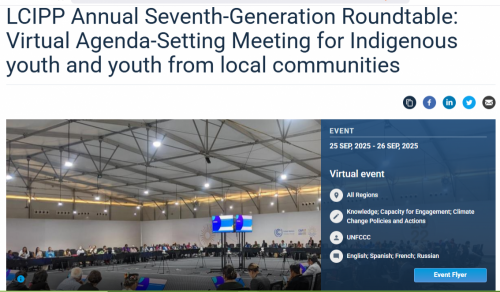
https://lcipp.unfccc.int/node/2133
Collective Approach 3 (CA3) under the Baku Workplan of the Local Communities and Indigenous Peoples Platform (LCIPP) focuses on uplifting the voices of Indigenous youth and youth from local communities in the UNFCCC process and thus supporting intergenerational and global commitments to address climate change and restore the integrity of nature.
CA3 advances intergenerational dialogue and consideration by grounding the work in the seventh-generation principle towards shaping long-horizon thinking in climate action and the UNFCCC process.
In preparation for COP 30, the FWG will convene virtual meetings with Indigenous youth and youth from local communities to co-shape the agenda for the first ever LCIPP Annual Seventh-Generation Round Table. These dialogues will ensure that the priorities of youth and future generations are reflected in global climate policy discussions, and that global climate actions benefit all and across generations.
The virtual meetings aim to:
- Build a shared understanding of the Seventh-Generation Principle in the context of climate action and holistic stewardship of nature.
- Gather ideas for agenda items and outputs for the Seventh-Generation Round Table at COP 30.
- Explore values, practices, and safeguards that must guide intergenerational climate action.
Expected Outputs
- Compilation of ideas and relevant materials to inform agenda-setting for the LCIPP Annual Seventh-Generation Roundtable
- Recommendations on approaches to ensuring the well-being of current and future generations, as envisioned under Article 3 of the Convention
- Case stories in diverse formats (e.g., photo stories, audio and video files, written materials) that articulate the Seventh-Generation Principle and its ethical application
Feature your work on the LCIPP Community Board! Share your stories, pictures, videos, publications and testimonials to build collective understanding and appreciation of the Seventh-Generation Principle.
Date, Time and Location
The virtual meeting will be organized as two sessions to allow wider participation from the different regions. Join either of the sessions convenient to you by registering below:
Session 1: 25 September 2025; 16:00 – 17:00 CEST
Interpretation: English <> Spanish
BACKGROUND
https://lcipp.unfccc.int/lcipp-background/overview
“We actively work with Indigenous peoples and local communities, nature's caregivers, under the Local Communities and Indigenous Peoples Platform. It is more widely recognised than ever that the global community benefits by bringing their values and knowledge systems into collective efforts to stabilize the climate system and reverse biodiversity decline.”
(Simon Stiell, Executive Secretary of the UNFCCC)
The Local Communities and Indigenous Peoples Platform (LCIPP) is an open and inclusive space and brings together people and their knowledge systems to build a climate resilient world for all.
In accordance with the Paris Agreement and Decision 1/CP.21, climate change is a common concern of humankind. When taking action to address climate change, the respective obligations on, inter alia, the rights of indigenous peoples and local communities should be respected, promoted and considered.
The COP has recognized the need to strengthen knowledge, technologies, practices and efforts of local communities and indigenous peoples related to addressing and responding to climate change. In this context, the LCIPP was established, for the exchange of experiences and sharing of best practices on mitigation and adaptation in a holistic and integrated manner.
The platform has been established to strengthen the knowledge, technologies, practices, and efforts of local communities and indigenous peoples related to addressing and responding to climate change, to facilitate the exchange of experience and the sharing of best practices and lessons learned on mitigation and adaptation in a holistic and integrated manner and to enhance the engagement of local communities and indigenous peoples in the UNFCCC process.
ABOUT THE FWG
https://lcipp.unfccc.int/facilitative-working-group-fwg/facilitative-wor...
Facilitative Working Group (FWG) of the Local Communities and Indigenous Peoples Platform (LCIPP) is a constituted body that was established at COP 24 in Katowice, December 2018.
The body was established to further operationalize the LCIPP and facilitate the implementation of its three functions related to knowledge, capacity for engagement, and climate change policies and actions (see decision 2/CP.23, paragraph 6 for more detail on the functions). In so doing, the FWG collaborates with other bodies under and outside the Convention, as appropriate, to enhance the coherence of the actions of the Platform under the Convention. The UNFCCC secretariat supports and facilitates the work of the body.
FWG is comprised of 14 representatives, half of which are representatives of Parties, and half of which are representatives from indigenous peoples organizations. The addition of three representatives of local communities and three additional Party representatives will be considered in 2021, as part of a broader review. More information on the "membership" is available here.
The body meets twice per year in conjunction with the sessions of the subsidiary bodies and the session of the Conference of the Parties. FWG proposed an initial two-year workplan for the period 2020–2021 for implementing the functions of the Platform.
The second three-year workplan for the period of 2022-2024 was proposed by FWG and was subsequently welcomed by Parties at COP 26 in Glasgow in November 2021. Further information on the work plan activities can be found here.
Furthermore, in Glasgow, the COP decided that the next review of the Facilitative Working Group will be held in 2024, including consideration of the request in decision 2/CP.24, paragraph 4, with a view to the Conference of the Parties adopting a decision on the review at its twenty-ninth session. The COP also requested the Facilitative Working Group to invite Parties, Indigenous Peoples and local communities and other stakeholders to make submissions by the 10th meeting of the Facilitative Working Group (November–December 2023) on the review. Submissions from Parties, admi
tted NGOs and other entities, can be seen here.
Baku Workplan of the Local Communities and Indigenous Peoples Platform
https://lcipp.unfccc.int/about-lcipp/workplan-activities
On 18 November 2024, COP 29 welcomed the Baku Workplan of the Local Communities and Indigenous Peoples Platform. The workplan has six collective approaches: 1) Gathering of Knowledge Holders; 2) Regional Engagement; 3) Seventh-Generation Round Table; 4) Collaboration with constituted bodies and workstreams of the UNFCCC; 5) Enhanced engagement with Parties; and 6) Overall Strategic Planning. To view the Baku Workplan, please visit here.









